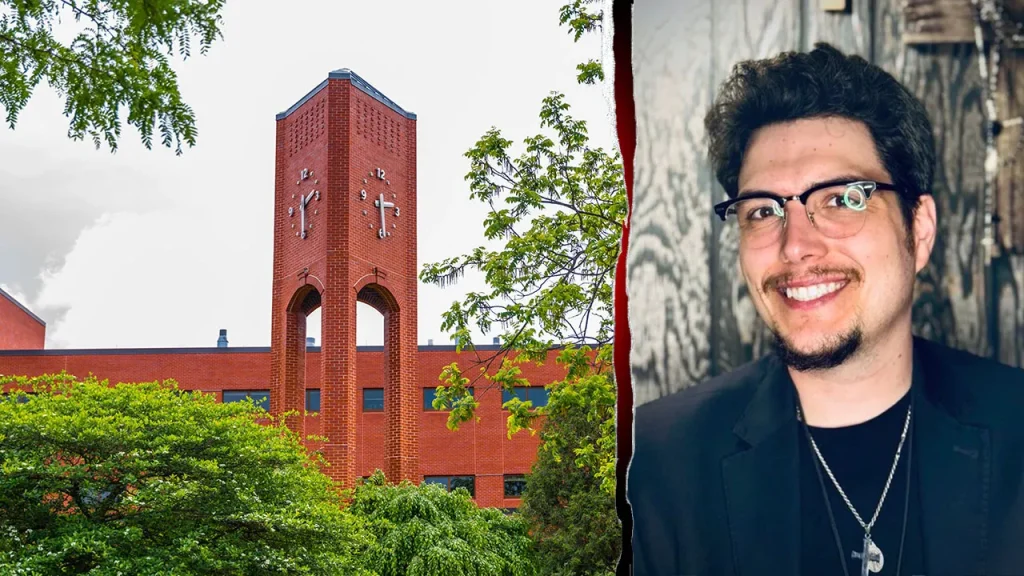Conservative Voices in Academia: The Chilling Aftermath of Charlie Kirk’s Assassination
In the wake of Charlie Kirk’s assassination on the campus of Utah Valley University, a Wisconsin professor’s candid Facebook post went viral, highlighting what he describes as an “isolating environment” for conservatives in academia. Trevor Tomesh, an assistant professor of computer, information and data science at the University of Wisconsin-River Falls, voiced his concern about the deafening silence from academic institutions following Kirk’s death, despite their claimed commitment to free expression and the exchange of ideas.
“The fact that Charlie was killed on a college campus for expressing his opinions and ideas—the one place in society that’s sole purpose is to express opinions and ideas—should be a watershed moment for all universities,” Tomesh wrote passionately on social media. He expressed disappointment that neither his university nor the University of Wisconsin system had issued any statement addressing the assassination. When he asked his students if any professors had discussed the incident, the answer was consistently no. This silence stands in stark contrast to the university’s response to a conservative Christian speaker named Sister Cindy Smock visiting campus, for which the school offered trauma counselors to students and “assembled a task force to determine how to handle people like Cindy and the trauma she inflicts on students.” Tomesh also expressed disgust at professors and students who celebrated Kirk’s assassination, highlighting what he perceives as a troubling double standard in academia’s treatment of conservative versus progressive viewpoints.
After his post gained traction, Tomesh received numerous private messages from faculty and staff worldwide, including those at his own university, who confided that they wished they had the courage to speak up as he did. He compares revealing conservative beliefs on campus to “coming out,” acknowledging that doing so often leads to isolation and potential backlash from colleagues, administration, or students. Tomesh recalled a previous position at a Canadian university where a department head warned him there would be “consequences” for expressing certain beliefs, illustrating the pressure many conservative academics feel to keep their views private. The hostile environment was further demonstrated when a chalk memorial to Kirk on campus was defaced with disturbing messages, including language similar to what was written on the bullet casing used in Kirk’s assassination. This climate has led many parents and students to contact Tomesh, expressing fear about attending college due to concerns about unfair treatment based on their political or religious beliefs.
The University of Wisconsin-River Falls defended its decision not to issue a statement on Kirk’s death, citing the Universities of Wisconsin’s Institutional Statements Policy that took effect last June. The policy, according to the university, is “rooted in the principle of institutional neutrality wherein such statements should be limited to matters ‘that directly affect the operations and core mission of the university and should maintain viewpoint neutrality in any reference to any matter.'” The school maintained that it is “committed to freedom of expression, viewpoint diversity, and respectful dialogue,” believing these values are “central to our mission and essential to the health of our democracy.” They also noted that their student affairs team had reached out to student organizations to offer support following the tragedy, but stopped short of making a public statement.
Tomesh specifically denounced the increasingly common rhetoric that portrays conservatives as “Nazis” and “fascists,” which he believes serves to dehumanize people with differing political views. He emphasized two critical points that need addressing in American society, particularly on college campuses. First, he argues that Americans need to unlearn the idea that speech itself constitutes violence—a concept that has gained traction in recent years. Second, he stresses the importance of separating political ideas from personal identity. When political ideology becomes someone’s entire identity, he explains, any critique of that ideology is perceived as an attack on the person themselves. “That’s one huge problem, I think, especially with the ideological progressives, is that they have taken an assumed identity, assumed ideas into part of their core identity,” he observed, adding that “any attack on an idea inevitably is interpreted as an attack on your personal identity and on you as a person.”
The professor offered a stark warning about America’s future if citizens cannot learn to tolerate dissenting opinions. “If we can’t do those two things, we’re done. We’re toast,” he cautioned, expressing genuine concern that “Western culture is over” and that civil war could result if Americans fail to separate speech from violence and political beliefs from personal identity. His comments reflect growing concerns about the polarization of American society and the increasingly intolerant atmosphere on many college campuses—places traditionally viewed as bastions of free inquiry and intellectual debate. The tragedy of Charlie Kirk’s assassination has become, for Tomesh and others, a troubling symbol of how far this polarization has gone and how difficult meaningful dialogue across political differences has become in academic settings and beyond.
While Tomesh emphasized that his views do not represent those of his university or the University of Wisconsin system, his willingness to speak publicly about these issues has resonated with many who share similar concerns about viewpoint diversity in higher education. The fact that so many of his colleagues privately expressed agreement while remaining publicly silent underscores his point about the “cold” and “isolating” environment that conservative faculty members often experience. As America grapples with increasing political violence and deepening partisan divisions, Tomesh’s call for tolerating differing opinions and separating political ideas from personal identity offers a potential path forward—though whether institutions of higher learning will embrace this approach remains to be seen.


